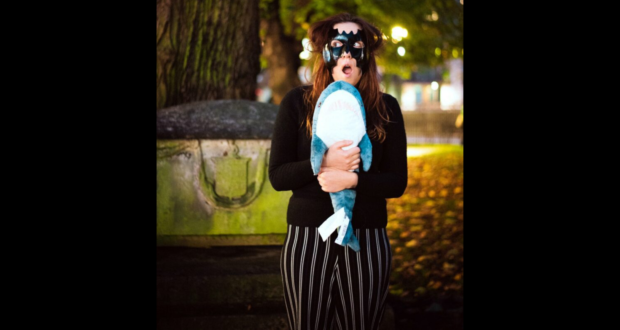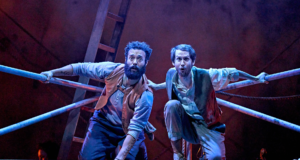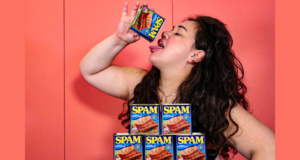Naomi Westerman on her show BATMAN (Naomi’s Death Show)
How to process the death of a parent? It could help to think now you have more in common with Batman. It could even help to think of vengeance! Which is just how Naomi Westerman aims to tackle it in her show BATMAN (Naomi’s Death Show), bringing personal tragedy to the stage as she explores how we cope with trauma.
BATMAN (Naomi’s Death Show) will be performing at VAULT festival on the 4 and 5 March, tickets available here.
We really need to start by asking what makes this a “death show”?
Batman is a show exploring death both from the perspective of grieving and how we as humans cope (or don’t cope) with grief, and from the perspective of looking at how death is exploited and commodified (e.g. by the true crime genre). Before I became a playwright I was an anthropologist studying death rituals in different cultures around the world, so I’ve always had an interest in how human society conceptualises and ritualises death and grief.
My parents were from very different cultures with very different perspectives on personal and emotional topics, so I always had that culture clash going on inside me, and an interest in how culture directs our psychological responses to trauma. Humanity as a species is so scarred by the Covid-19 pandemic and the huge loss of life, I think now more than ever we need to start to find ways to talk openly about death and bereavement, and find ways to embrace communal grieving.
Why have you chosen “BATMAN” as the show’s title?
Batman is an autobiographical story, detailing how I tried to uncover the truth about my mother’s sudden death, and how I brought the person responsible to justice. Batman felt like a very obvious choice of title given the subject matter!
This show satirises the true crime genre – what can you tell us about your thoughts on the genre more broadly?
I’ve been obsessed with mysteries since I was a young child, devouring Nancy Drew books and reading everything I could get my hands on about Stonehenge and Atlantis. This interest in mysteries led me to the fringes of the true crime community, and I became fascinated with unsolved cases like the disappearances of Asha Degree and Maura Murray. But I wasn’t comfortable with the more exploitative aspects of the true crime community, the way true crime reduces people’s deepest traumas to entertainment, the way outlandish theories take precedence over the often mundane reality: most disappearances are either people getting lost in the woods, or suicides; most homicides are due to domestic violence; Elisha Lam died because of mental illness not any big spooky mystery; and men who kill women are losers who shouldn’t be glamorised or turned into celebrities. Yet the biggest demographic within the true crime community is women, and many women say they enjoy true crime because they find it empowering, in teaching them what not to do. It feels like true crime is in a period of change, with more focus put on telling the victims’ stories.
How have you gone about making the theme of death something to entertain audiences?
My philosophy when making autobiographical work is to just tell my story openly and honestly, and let it find its own audience. Some people will connect with that and some won’t, and this play has been extremely divisive. I’ve had audiences in tears, audience members contacting the theatre to pass on letters about how much the play moved them. On the other hand some people haven’t liked it at all! People who’ve experienced bereavement definitely relate to the play in a different way than those who haven’t. However there are lots of interactive elements, fun and lighter bits, comedy, and things like spoof game shows — I very much wanted something different from the cliched “I’m going to stand on a stage for an hour and tell you about my trauma” one-person show.
I see that you have been working on a TV series about a criminal gang of people with disabilities – what is it that draws you to these sensitive topics?
I don’t see it as being drawn to sensitive topics, so much as using entertainment to reflect the world we live in. As a disabled writer it feels very obvious to write things with disabled characters, just because disabled people are part of the world. It doesn’t make sense that so much TV, film and theatre seem to take place in a world where disabled people don’t exist, because that’s just not reality. We no longer tolerate TV shows and films that take place in a world where everyone is white, or everyone is cishet; why does disability lag so far behind in the conversation about diversity? My TV series The Faulty Elephants is a comedy and a heist caper, that just happens to have disabled people in the lead roles – though it does use the concept of disabled people thumbing their noses at the system to make points about how the Tory government has systemically oppressed and marginalised disabled people. Comedy is political!
Has devising this production affected your process of bereavement?
My mum died in 2018, my father a few years before that, my grandparents and aunt before that. I’ve done a lot of work in processing that grief and my writing has been a huge part of that, but I feel like I’m coming to the end of my Death Period now. The problem with theatre is that everything takes so damn long; work that felt very raw and urgent when you were writing it feels very different when you finally step into a rehearsal room years later. I landed two huge projects the same year my mum died and it was the best and the worst timing. Working on the James Graham Sketching play (which I started weeks after my mother died) absolutely saved my life, landing my first major commission the same year was obviously a thrill, but the circumstances of my mother’s death were so overwhelming I wasn’t in a place to write about anything else while actively dealing with not just grief but all kinds of practical stuff with lawyers and police. I just didn’t have my head straight, so everything I wrote for two years was just kind of unprocessed trauma – not ideal when you’ve finally reached the stage where people want to commission and programme you! And it’s only now, years later, that the plays I wrote then are reaching the stage, and I’m having to choose how much of that rawness to keep, how much to change, and how much of myself I’m comfortable sharing with an audience. Batman started life as a live storytelling gig in 2020 so I wrote it with more distance and perspective, and that’s been hugely beneficial.
What would you hope that viewers dealing with grief can take away from this production?
I hope they take away the knowledge that they are not alone, that coming together to embrace grief can be very powerful, and that there are people who understand what you’re going through. And that grief sucks, it’s painful, but it’s also okay to find the moments of joy or humour in the grieving process.
Given that Blahaj the shark features in your promotional materials, can we expect to see this star in the spotlight?
Blahaj played a crucial cameo role of Naomi’s Emotional Support Shark in our work-in-progress performance at the Pleasance, but Blahaj was frankly a bit of a diva to work with. We’re possibly going back to the drawing board on that one. But Blahaj remains a valued member of team Little but Fierce, so I’m sure they’ll pop up in some form.
Many thanks to Naomi for chatting to us about BATMAN (Naomi’s Death Show). You can catch the show when it comes to VAULT Festival 2023 on Saturday 4 March (4.10pm and 8.40pm) and Sunday 5 March (8.40pm). Further information and bookings can be found here.
 Everything Theatre Reviews, interviews and news for theatre lovers, London and beyond
Everything Theatre Reviews, interviews and news for theatre lovers, London and beyond



